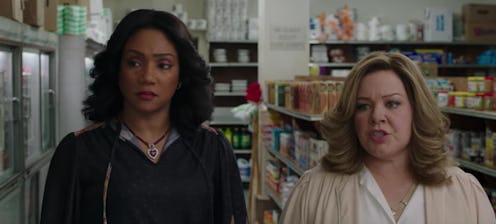Entertainment
Why It’s So Important That ‘The Kitchen’ Doesn’t Dilute The Violent Comics It’s Based On
The upcoming film, The Kitchen, out Aug. 9 stands out from typical gangster movies by depicting a group of female mobsters rather than the typical organized crime boys club. Elisabeth Moss, Melissa McCarthy, and Tiffany Haddish play three women who go against the male-fronted Irish mob that runs their New York City neighborhood after their husbands end up in prison and they're left to fend for themselves. While not a true story, The Kitchen is based on comic books that are thrilling to read.
The Kitchen eight-part comics book series was published in 2015 on DC's Vertigo imprint, which also published the more recent crime thriller comic, American Carnage. This June, though, DC announced that the imprint will shut down at the end of 2019. Regardless of Vertigo's future, The Kitchen was clearly a success now that it's getting a film adaptation packed with A-listers.
The 1970s-set story was written by Ollie Masters, with art by illustrator Ming Doyle and colorist Jordie Bellaire. Like the film, The Kitchen comic books follow three women. And both start off the same way, with Kath, Angie and Raven (or Kathy, Ruby and Claire, as they're called in the movie) picking up the pieces of their husbands' unfinished business with the Irish mafia. What starts off as simple due collecting turns into a much bigger operation as the three women, left to their own devices, realize that they can probably do a better job running crime operations than their husbands did.
The most thrilling part of the comic book series is the way that it puts women in roles so often dominated by male characters. The women in the comics grow into their mob roles naturally, too, as the blog Women Write About Comics points out that it's like the three characters have the same violent instincts as their male adversaries do. "Kath’s impulse to beat a man and shoot off his ear, Angie’s choice to gut a man with an ashtray rather than be blackmailed, and Raven’s willingness to tangle, both romantically and in business, with the Italian mob, take up surprisingly large amounts of space not only in panels but also in captions," WWAC said in a review.
One of the biggest fears that some fans of The Kitchen comic books have expressed in anticipation of the film adaptation is that the movie might dilute the feminist tone of the comics. There are few recurring male characters in the comics, but they're not there to take the spotlight. In an interview with NewsaRama, The Kitchen's creator, Masters, explained, "While the male characters are important to this story, this is all about Kath, Raven and Angie. It's their story and everyone else are essentially supporting characters."
For instance, one of the main male gangster characters in the comic series is named Tommy, who becomes like a lackey to the three women rather than a leader of their new crew. Tommy exists to drive the getaway car rather than complete a hit himself, and even though other male gangsters — including the three women's husbands — have parts in the comics, they're similarly less important to the major story arcs.
As Masters told NewsaRama, The Kitchen doesn't only serve up women who kick ass and take names without a fair share of character development. The comic book series gets deep into "how they change as they get more actively involved in the criminal life," Masters said. While seeing women in traditionally male roles can be empowering in itself, the fact that The Kitchen comics also make sure to dive into its protagonists' psyches and personal lives makes it an undeniably feminist series.
